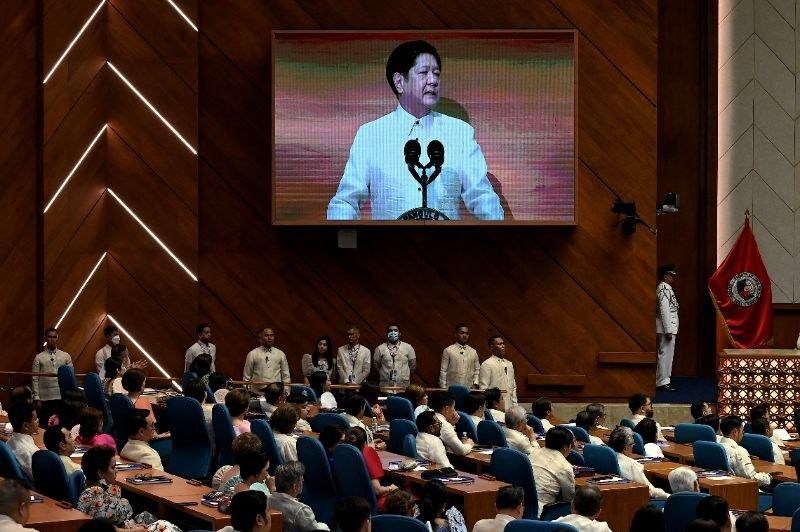Climate solutions, green issues take a backseat in Marcos' 2nd SONA

MANILA, Philippines — President Ferdinand “Bongbong” Marcos Jr. briefly mentioned climate change and was silent about the country’s biggest environmental issues in his second State of the Nation Address, leaving green groups unsatisfied and seeking more concrete solutions.
Marcos frequently mentioned the need to address climate change and protect the environment in his speeches at home and abroad during his first year as the president.
“The building blocks of progressive, livable and sustainable communities will never be complete without appropriate and responsible action to mitigate and adapt to the effects of climate change,” Marcos said Monday, adding his administration treats climate change as an “important criterion” in crafting national policies.
The chief executive mentioned the need to develop green and blue economies, and protect and preserve forests as well as the commitment of the country to meet the global decarbonization goals.
He also touched on the adoption of a “circular economy”—or maximizing resource efficiency while minimizing environmental impacts and greenhouse gas emissions.
“Just like our climate change action, this new system requires the participation of all sectors of society, up to each individual citizen, for it to succeed,” the president said.
But Marcos did not mention any policy or program to achieve these.
Greenpeace said that Marcos’ SONA “did not accurately reflect the real state of the nation, painting a naively positive outlook for the country that fails to consider much needed action to address the serious and urgent challenges posed by the climate crisis that is now compounded by a severe El Niño.”
Disaster response
The Philippines is one of the countries most affected by extreme climate events, with poor and rural communities bearing the brunt of disasters.
Marcos said the government is reorganizing its response teams to make them “more adaptable, agile and effective” in times of calamities and crises. He added that evacuation centers are being upgraded to withstand extreme weather events.
“We have learned many painful lessons from past disasters. We continue to be alert and prepared in our disaster response. It has, in fact, been commented that sometimes we are over-prepared for such natural disasters,” he said.
Greenpeace campaigner Jefferson Chua said this pronouncement “shows a lack of awareness of the reality on the ground.”
“The climate crisis demands a genuine whole-of-society approach, one that ensures that historically marginalized and oppressed sectors are given their due,” he said.
Climate scientists backed by the United Nations earlier called on countries to strengthen measures that will help people cope in a warming world. The Intergovernmental Panel on Climate Change also warned that “rapid and far-reaching transitions” across all sectors and systems are needed to secure a liveable and sustainable future for all.
Silence on green issues
Marcos did not mention the first major environmental disaster of his administration: the oil spill in Oriental Mindoro.
Protect Verde Island Passage—a coalition of communities and environmentalists advocating for the protection of the marine corridor—stressed that the oil spill crisis is far from over.
“Marcos himself committed that he will resolve this crisis in under four months, and we take its absence in his speech as his admission of failing to meet his own deadline. Is the plight of more than 24,000 fisherfolk not worth mentioning or is the oil spill now a crisis forgotten?” Protect VIP said.
Kalikasan People’s Network for the Environment national coordinator Jon Bonifacio also said that Marcos’ failure to highlight other environmental issues such as reclamation and mining “really throws into question whether this was really an honest report on the state of the nation or a sanitized ad reel for foreign investors.”
Bonifacio and Legal Rights and Natural Resources Center executive director E.M. Taqueban criticized Marcos’ continued silence on escalating attacks against environmental defenders and lack of recognition of indigenous peoples in his speech.
“Land distribution, infrastructure expansionism, and energy development are once again touted without addressing how these have aggravated conflicts with indigenous lands,” Taqueban said, adding that Marcos’ promotion of renewable energy failed to mention its link with the intensification of mining for so-called energy transition metals.
In its 2022 report, LRC found that 49% of Certificate of Ancestral Domain Titles (CADTs) have land or environmental conflicts. An area equivalent to more than 13% of the total land area of these indigenous lands in conflict are covered by infrastructure, energy, and land development projects.
What needs to be done
The Climate Reality Project Philippines and Greenpeace urged Marcos to do the following:
- Develop a comprehensive roadmap for implementing our Nationally Determined Contributions or climate plans
- Modernize power grid to harness distributed, cheaper, and more reliable power from renewable energy
- Ban single-use plastics
- Call on the world’s biggest polluters to take responsibility for climate impacts, and make them pay reparations for their contributions to the climate crisis
- Phase out coal
- Latest

























